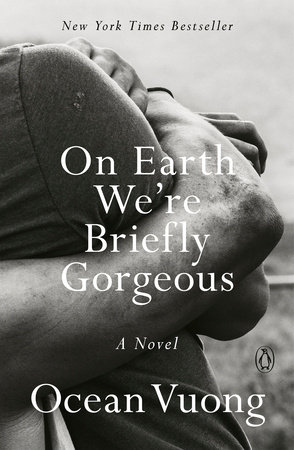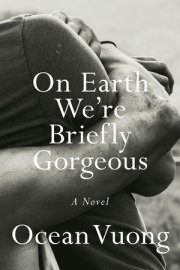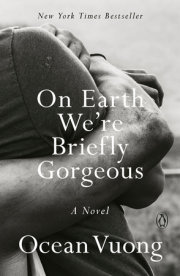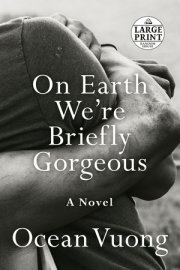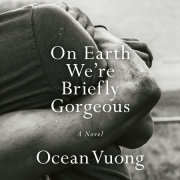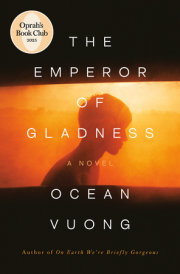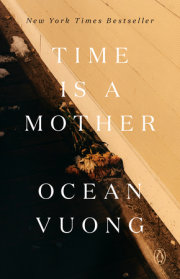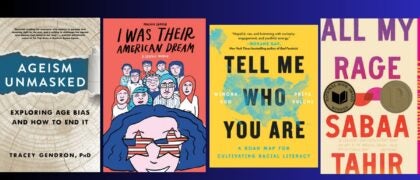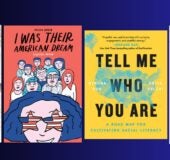I
Let me begin again.
Dear Ma,
What I am about to tell you you will never know. But so be it. I am writing to reach you-even if each word I put down is one word further from where you are. I am writing to go back to the time, at the rest stop in Virginia, when you stared, horror-struck, at the taxidermy buck hung over the soda machine by the restrooms, its antlers shadowing your face. In the car, you kept shaking your head. "I don't understand why they would do that. Can't they see it's a corpse? A corpse should go away, not get stuck forever like that."
I think now of that buck, how you stared into its black glass eyes and saw your reflection, your whole body, warped in that lifeless mirror. How it was not the grotesque mounting of a decapitated animal that shook you-but that the taxidermy embodied a death that won't finish, a death that keeps dying as we walk past it to relieve ourselves.
I am writing because they told me to never start a sentence with because. But I wasn't trying to make a sentence-I was trying to break free. Because freedom, I am told, is nothing but the distance between the hunter and its prey.
Autumn. Somewhere over Michigan, a colony of monarch butterflies, numbering more than fifteen thousand, are beginning their yearly migration south. In the span of two months, from September to November, they will move, one wing beat at a time, from southern Canada and the United States to portions of central Mexico, where they will spend the winter.
They perch among us, on windowsills and chain-link fences, clotheslines still blurred from the just-hung weight of clothes, windowsills, the hood of a faded-blue Chevy, their wings folding slowly, as if being put away, before snapping once, into flight.
It only takes a single night of frost to kill off a generation. To live, then, is a matter of time, of timing.
That time when I was five or six and, playing a prank, leapt out at you from behind the hallway door, shouting, "Boom!" You screamed, face raked and twisted, then burst into sobs, clutched your chest as you leaned against the door, gasping. I stood bewildered, my toy army helmet tilted on my head. I was an American boy parroting what I saw on TV. I didn't know that the war was still inside you, that there was a war to begin with, that once it enters you it never leaves-but merely echoes, a sound forming the face of your own son. Boom.
That time, in third grade, with the help of Mrs. Callahan, my ESL teacher, I read the first book that I loved, a children's book called
Thunder Cake, by Patricia Polacco. In the story, when a girl and her grandmother spot a storm brewing on the green horizon, instead of shuttering the windows or nailing boards on the doors, they set out to bake a cake. I was unmoored by this act, its precarious yet bold refusal of common sense. As Mrs. Callahan stood behind me, her mouth at my ear, I was pulled deeper into the current of language. The story unfurled, its storm rolled in as she spoke, then rolled in once more as I repeated the words.
To bake a cake in the eye of a storm; to feed yourself sugar on the cusp of danger. Because I am your son, this made perfect sense. The first time you hit me, I must have been four. A hand, a flash, a reckoning. My mouth a blaze of touch.
The time I tried to teach you to read the way Mrs. Callahan taught me, my lips to your ear, my hand on yours, the words moving underneath the shadows we made. But that act (a son teaching his mother) reversed our hierarchies, and with it our identities, which, in this country, were already tenuous and tethered. After the stutters and false starts, the sentences warped or locked in your throat, after the embarrassment of failure, you slammed the book shut. "I don't need to read," you said, your expression crunched, and pushed away from the table. "I can see-it's gotten me this far, hasn't it?"
Then the time with the remote control. A bruised welt on my forearm I would lie about to my teachers. "I fell playing tag."
The time, at forty-six, when you had a sudden desire to color. "Let's go to Walmart," you said one morning. "I need coloring books." For months, you filled the space between your arms with all the shades you couldn't pronounce. Magenta, vermilion, marigold, pewter, juniper, cinnamon. Each day, for hours, you slumped over landscapes of farms, pastures, Paris, two horses on a windswept plain, the face of a girl with black hair and skin you left blank, left white. You hung them all over the house, which started to resemble an elementary school classroom. When I asked you, "Why coloring, why now?" you put down the sapphire pencil and stared, dreamlike, at a half-finished garden. "I just go away in it for a while," you said, "but I feel everything. Like I'm still here, in this room."
The time you threw the box of Legos at my head. The hardwood dotted with blood.
"Have you ever made a scene," you said, filling in a Thomas Kinkade house, "and then put yourself inside it? Have you ever watched yourself from behind, going further and deeper into that landscape, away from you?"
How could I tell you that what you were describing was writing? How could I say that we, after all, are so close, the shadows of our hands, on two different pages, merging?
"I'm sorry," you said, bandaging the cut on my forehead. "Grab your coat. I'll get you McDonald's." Head throbbing, I dipped chicken nuggets in ketchup as you watched. "You have to get bigger and stronger, okay?"
I reread Roland Barthes's Mourning Diary yesterday, the book he wrote each day for a year after his mother's death. I have known the body of my mother, he writes, sick and then dying. And that's where I stopped. Where I decided to write to you. You who are still alive.
Those Saturdays at the end of the month when, if you had money left over after the bills, we'd go to the mall. Some people dressed up to go to church or dinner parties; we dressed to the nines to go to a commercial center off I 91. You would wake up early, spend an hour doing your makeup, put on your best sequined black dress, your one pair of gold hoop earrings, black lamŽ shoes. Then you would kneel and smear a handful of pomade through my hair, comb it over.
Seeing us there, a stranger couldn't tell that we bought our groceries at the local corner store on Franklin Avenue, where the doorway was littered with used food stamp receipts, where staples like milk and eggs cost three times more than they did in the suburbs, where the apples, wrinkled and bruised, lay in a cardboard box soaked on the bottom with pig's blood that had leaked from the crate of loose pork chops, the ice long melted.
"Let's get the fancy chocolates," you'd say, pointing to the Godiva chocolatier. We would get a small paper bag containing maybe five or six squares of chocolate we had picked at random. This was often all we bought at the mall. Then we'd walk, passing one back and forth until our fingers shone inky and sweet. "This is how you enjoy your life," you'd say, sucking your fingers, their pink nail polish chipped from a week of giving pedicures.
The time with your fists, shouting in the parking lot, the late sun etching your hair red. My arms shielding my head as your knuckles thudded around me.
Those Saturdays, we'd stroll the corridors until, one by one, the shops pulled shut their steel gates. Then we'd make our way to the bus stop down the street, our breaths floating above us, the makeup drying on your face. Our hands empty except for our hands.
Out my window this morning, just before sunrise, a deer stood in a fog so dense and bright that the second one, not too far away, looked like the unfinished shadow of the first.
You can color that in. You can call it "The History of Memory."
Migration can be triggered by the angle of sunlight, indicating a change in season, temperature, plant life, and food supply. Female monarchs lay eggs along the route. Every history has more than one thread, each thread a story of division. The journey takes four thousand eight hundred and thirty miles, more than the length of this country. The monarchs that fly south will not make it back north. Each departure, then, is final. Only their children return; only the future revisits the past.
What is a country but a borderless sentence, a life?
That time at the Chinese butcher, you pointed to the roasted pig hanging from its hook. "The ribs are just like a person's after they're burned." You let out a clipped chuckle, then paused, took out your pocketbook, your face pinched, and recounted our money.
What is a country but a life sentence?
The time with a gallon of milk. The jug bursting on my shoulder bone, then a steady white rain on the kitchen tiles.
The time at Six Flags, when you rode the Superman roller coaster with me because I was too scared to do it alone. How you threw up afterward, your whole head in the garbage can. How, in my screeching delight, I forgot to say Thank you.
The time we went to Goodwill and piled the cart with items that had a yellow tag, because on that day a yellow tag meant an additional fifty percent off. I pushed the cart and leaped on the back bar, gliding, feeling rich with our bounty of discarded treasures. It was your birthday. We were splurging. "Do I look like a real American?" you said, pressing a white dress to your length. It was slightly too formal for you to have any occasion to wear, yet casual enough to hold a possibility of use. A chance. I nodded, grinning. The cart was so full by then I no longer saw what was ahead of me.
The time with the kitchen knife-the one you picked up, then put down, shaking, saying quietly, "Get out. Get out." And I ran out the door, down the black summer streets. I ran until I forgot I was ten, until my heartbeat was all I could hear of my name.
The time, in New York City, a week after cousin Phuong died in the car wreck, I stepped onto the uptown 2 train and saw his face, clear and round as the doors opened, looking right at me, alive. I gasped-but knew better, that it was only a man who resembled him. Still, it upended me to see what I thought I'd never see again-the features so exact, heavy jaw, open brow. His name lunged to the fore of my mouth before I caught it. Aboveground, I sat on a hydrant and called you. Ma, I saw him, I breathed. Ma, I swear I saw him. I know it's stupid but I saw Phuong on the train. I was having a panic attack. And you knew it. For a while you said nothing, then started to hum the melody to Happy Birthday. It was not my birthday but it was the only song you knew in English, and you kept going. And I listened, the phone pressed so close to my ear that, for the rest of the night, a pink rectangle was imprinted on my cheek.
I am twenty-eight years old, 5ft 4in tall, 112lbs. I am handsome at exactly three angles and deadly from everywhere else. I am writing you from inside a body that used to be yours. Which is to say, I am writing as a son.
If we are lucky, the end of the sentence is where we might begin. If we are lucky, something is passed on, another alphabet written in the blood, sinew, and neuron; ancestors charging their kin with the silent propulsion to fly south, to turn toward the place in the narrative no one was meant to outlast.
The time, at the nail salon, I overheard you consoling a customer over her recent loss. While you painted her nails, she spoke, between tears. "I lost my baby, my little girl, Julie. I can't believe it, she was my strongest, my oldest."
You nodded, eyes sober behind your mask. "It's okay, it's okay," you said in English, "don't cry. Your Julie," you went on, "how she die?"
"Cancer," the lady said. "And in the backyard, too! She died right there in the backyard, dammit."
You put down her hand, took off your mask. Cancer. You leaned forward. "My mom, too, she die from the cancer." The room went quiet. Your co-workers shifted in their seats. "But what happen in backyard, why she die there?"
The woman wiped her eyes. "That's where she lives. Julie's my horse."
You nodded, put on your mask, and got back to painting her nails. After the woman left, you flung the mask across the room. "A fucking horse?" you said in Vietnamese. "Holy shit, I was ready to go to her daughter's grave with flowers!" For the rest of the day, while you worked on one hand or another, you would look up and shout, "It was a fucking horse!" and we'd all laugh.
The time, at thirteen, when I finally said stop. Your hand in the air, my cheek bone stinging from the first blow. Stop, Ma. Quit it. Please. I looked at you hard, the way I had learned, by then, to look into the eyes of my bullies. You turned away and, saying nothing, put on your brown wool coat and walked to the store. I'm getting eggs, you said over your shoulder, as if nothing had happened. But we both knew you'd never hit me again.
Monarchs that survived the migration passed this message down to their children. The memory of family members lost from the initial winter was woven into their genes.
When does a war end? When can I say your name and have it mean only your name and not what you left behind?
The time I woke into an ink-blue hour, my head-no, the house-filled with soft music. My feet on cool hardwood, I walked to your room. Your bed was empty. "Ma," I said, still as a cut flower over the music. It was Chopin, and it was coming from the closet. The door etched in reddish light, like the entrance to a place on fire. I sat outside it, listening to the overture and, underneath that, your steady breathing. I don't know how long I was there. But at one point I went back to bed, pulled the covers to my chin until it stopped, not the song but my shaking. "Ma," I said again, to no one, "come back. Come back out."
Copyright © 2019 by Ocean Vuong. All rights reserved. No part of this excerpt may be reproduced or reprinted without permission in writing from the publisher.

